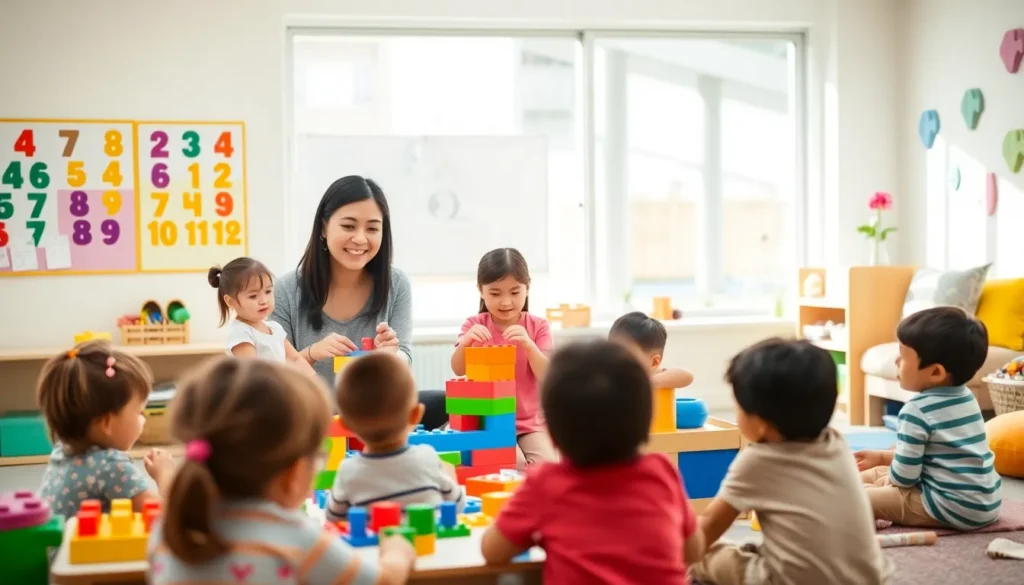Table of Contents
ToggleIn the bustling world of parenting, one question often arises: is preschool necessary? Picture this, parents juggling work, home life, and a zillion responsibilities while trying to decipher if their little one is ready for the big school system. It can get chaotic. Preschool, as a stepping stone, promises to ease this transition. After all, no one wants to drop their bundle of joy off at kindergarten unprepared, right? Let’s unravel the mystery behind preschool and evaluate its importance, potential benefits, and alternatives with a sprinkle of humor and a lot of valuable insights.
Understanding Preschool and Its Purpose

Preschool serves as an introductory phase for children, typically ages 3 to 5, before they jump into the more structured world of kindergarten. But what’s the big deal?
Essentially, preschool is all about laying foundations. It isn’t just a place to drop off kids while parents go about their day. This environment helps spark curiosity, creativity, and the joy of learning. Children are introduced to basic concepts like numbers, letters, and the ever-elusive concept of sharing. Teachers cultivate an atmosphere where children can explore new ideas through structured play, preparing them for the more formal education that lies ahead.
So, is preschool a necessary rite of passage for every child? Let’s find out.
Cognitive Benefits of Attending Preschool
Cognitive benefits are often at the top of parents’ lists when they think about preschool. Research suggests that children who attend preschool score higher in various cognitive skills compared to their peers who don’t. For instance, letter recognition and vocabulary development flourish with early exposure to language-rich environments.
Think about it this way: preschool isn’t just a place for colorful crayons and snack time. It’s an incubator for critical thinking. Children are encouraged to ask questions, solve puzzles, and engage in activities that require focus and attention, all essential skills they can carry into their academic futures. Plus, they learn to approach challenges with a curious mind instead of shying away, paving the way for lifelong learning.
Social and Emotional Development in Preschool
Let’s not forget about the social and emotional skills essential for navigating life. Preschool is often the first place many children encounter structured social interactions outside their immediate family.
Here, children learn to share toys, take turns, and communicate feelings. They bond with their peers, understand social cues, and develop empathy, all critical skills to help them thrive in future group settings. Emotional resilience is fostered too, as they face the inevitable ups and downs of early friendships.
Consider it training for life’s more complicated social scenarios, after all, the playground isn’t just for fun: it’s a vital learning environment.
Alternative Early Education Options
So, what if preschool isn’t in the cards? Fear not. There are numerous alternative early education options. Home-based learning, for example, can be just as enriching when parents take an active role.
Classes like music, art, or even nature immersion programs offer structured learning experiences without the traditional classroom setting. Also, playgroups provide invaluable social interaction opportunities. These alternatives can cater to a child’s unique needs, ensuring they still gain the necessary skills before entering kindergarten.
The Impact of Preschool on Future Academic Success
Often, the question of preschool’s necessity leads directly to its long-term impact on academic success. Studies have shown that children who attend preschool are generally more prepared for the academic rigors of kindergarten and beyond. They typically perform better in literacy and numeracy assessments.
That said, it’s crucial to remember that preschool isn’t a guarantee of academic superiority. Factors like home support and individual personalities also play pivotal roles in determining future success. But, enrolling in preschool can certainly give children a head start on the journey to educational excellence.
Considerations for Parents: Is Preschool Right for Your Child?
Deciding on preschool can feel overwhelming. Parents must weigh factors like their child’s readiness, the family’s financial situation, and available local options. Sometimes, the unique personality of a child can sway this decision too. For example, some kids flourish in structured settings, while others shine in more relaxed environments.
Visiting local preschools, talking to educators, and observing interactions can provide valuable insights. What’s right for one child might not be the best fit for another. Trusting parental instincts while seeking guidance can lead to the best decision.




